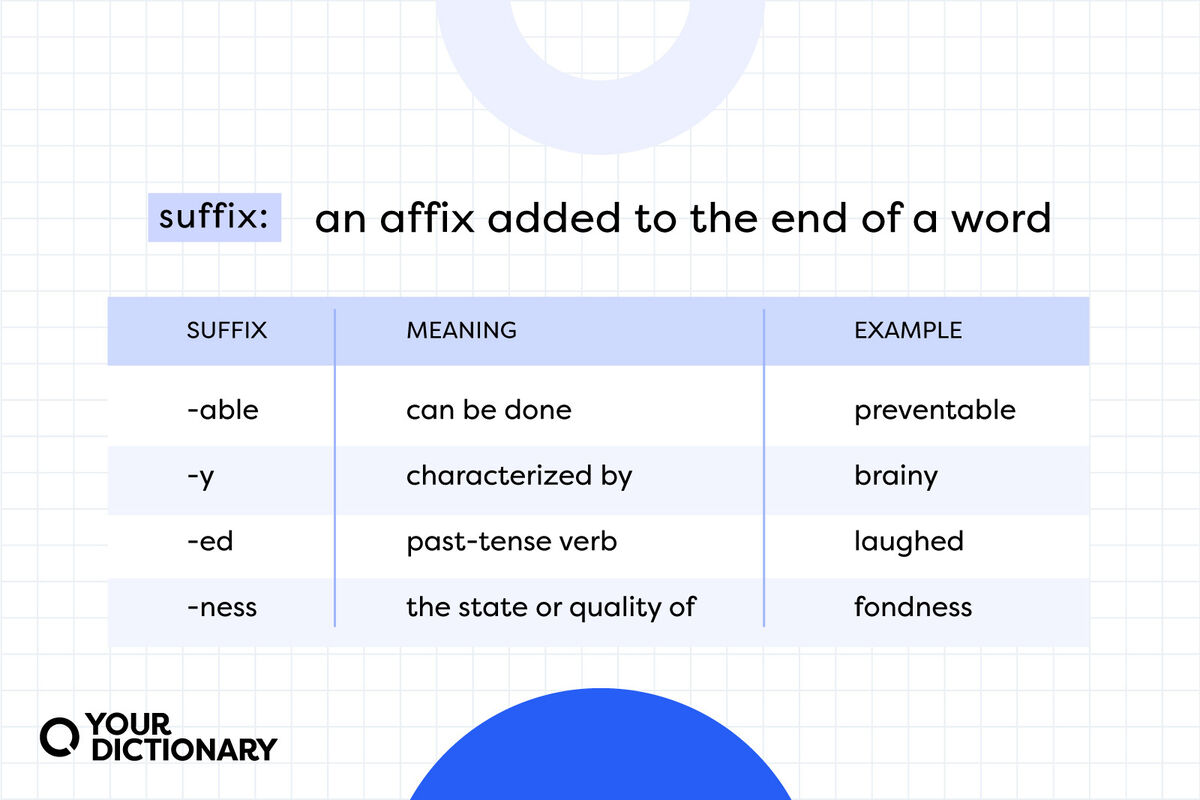
A suffix is a letter or group of letters added to the end of a word to change its meaning or function. These useful, shapeshifting tools can be as small as -s and -ed or can be larger additions such as -ation and -ious. Learn more about suffixes by checking out a clear definition and exploring a suffixes list.
The Function of a Suffix
A suffix is a type of affix. Suffixes change the meaning or grammatical function of a base word or root word. For example, by adding the suffixes -er and -est to the adjective fond, you create the comparative fonder and the superlative fondest. Explore a suffixes list to broaden your vocabulary.
Examples of Suffixes
Like prefixes, there are many suffixes used in the English language to create a rich vocabulary. Take the suffix -ist for example, by adding this to a word, you have changed the word to describe a person who performs or practices something. So, art becomes artist, a person skilled in a particular art.
Let's look at the verb read. This verb can be turned into a noun by adding the suffix -er so read becomes reader. Likewise, by adding the suffix -able, the verb read now becomes the adjective readable. Check out a list of noun, adjective, verb, and adverb suffix examples.
Noun Suffixes
Nouns are used to identify a person, place, thing, or idea. Dive into a list of noun suffixes along with their meaning and examples.
|
Suffix |
Meaning |
Example |
| -ee | individual does something |
referee, employee, trustee, retiree |
|
-eer |
engaged in something, associated with something |
auctioneer, volunteer, engineer, profiteer |
|
-er |
someone who performs an action |
helper, teacher, preacher, dancer |
|
-ion |
the action or process of |
celebration, opinion, decision, revision |
|
-ism |
theory, act or belief | criticism, humanism, professionalism, patirotism |
|
-ity |
the state or condition of |
probability, equality, abnormality, civility |
|
-ment |
the action or result of |
movement, retirement, abandonment, establishment |
|
-ness |
a state or quality |
fondness, awareness, kindness, darkness |
|
-or |
a person who is something |
distributor, investigator, translator, conductor |
|
-sion |
state or being |
depression, confusion, tension, compulsion |
|
-ship |
position held |
worship, ownership, courtship, internship |
|
-th |
state or quality |
strength, labyrinth, depth, warmth |
Adjective Suffixes
Since you can have noun suffixes, it only makes sense that you can have adjective suffixes too. These suffixes work to make words that you can use to describe things.
|
Suffix |
Meaning |
Example |
|
-able, -ible |
capable of being |
preventable, adaptable, predictable, credible |
|
-al |
pertaining to |
theatrical, natural, criminal, seasonal |
|
-ant |
inclined to or tending to |
vigilant, defiant, brilliant, reliant |
|
-ary |
of or relating to |
budgetary, planetary, military, honorary |
|
-ful |
full of or notable of |
grateful, beautiful, wonderful, fanciful |
|
-ic |
relating to |
iconic, organic, heroic, poetic |
|
-ious, -ous |
having qualities of |
gracious, cautious, humorous, fabulous |
|
-ive |
quality or nature of |
creative, expensive, expressive, preventive |
|
-less |
without something |
hopeless, faultless, fearless, restless |
|
-y |
made up of or characterized by |
brainy, fruity, tasty, grouchy |
Verb Suffixes
In a sentence, you use a verb to tell the action or state. For example, you laughed at the joke. See a few different verb suffixes that you might use in your sentences.
|
Suffix |
Meaning |
Example |
|
-ed |
past-tense version of a verb |
laughed, climbed, called, missed |
|
-en |
become |
soften, fasten, lengthen, strengthen |
|
-er |
action or process, making an adjective comparative |
faster, bigger, fuller, longer |
|
-ing |
verb form/present participle of an action |
laughing, swimming, driving, writing |
|
-ize, -ise |
to cause or to become |
memorialize, authorize, commercialize, advertise |
Adverb Suffixes
Information in a sentence is key. Therefore adverbs are important because they convey information about adjectives or verbs. Check out these adverb suffix examples at work.
|
Suffix |
Meaning |
Example |
|
-ly |
in what manner something is being done |
bravely, simply, honestly, gladly |
|
-ward |
in a certain direction |
backward, wayward, awkward, afterward |
|
-wise |
in relation to |
clockwise, edgewise, lengthwise, otherwise |
Using Suffixes
Suffixes create variety in the English language. They provide endless ways to express our thoughts, feelings, findings, and emotions. They morph nouns into adjectives and verbs into nouns. They express deeper qualities, providing layers of color and intrigue required by writers.
Be aware that sometimes adding a suffix to a base word changes the spelling of the new word, as in create/creative. To help you learn why and when this happens read suffix spelling rules.